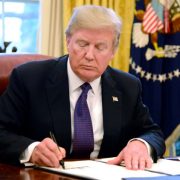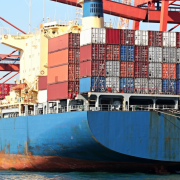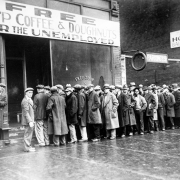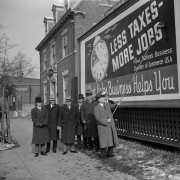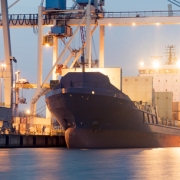Tariffs seem to be the topic on everyone’s minds these days, as Trump’s trade war continues. But as we contemplate the consequences that such protectionist policies may have on our modern economy, we would be wise to take a sober look at history. For if we take a closer look at the causes that led to, and prolonged, the Great Depression, we will find that tariffs played a most important and destructive role.
Smoot-Hawley Tariff
Over the last several months, thousands of economists have warned of the negative consequences that inevitably arise from imposing tariffs on foreign countries. Many fear what might happen to the economy if Trump continues his love affair with protectionism. And this fear is not unwarranted or unprecedented.
As mentioned previously, the Austrian business cycle teaches us that economic booms and busts will always occur when the state meddles in the economy. But the situation tends to grow much worse and lasts much longer the more governments intervene and try to correct their mistakes. This is exactly what happened with Smoot-Hawley.
By the time the Smoot-Hawley Tariff Act was passed in 1930, the market had already experienced an economic bust. Economists had warned that instituting new tariffs would result in the economy falling further into a recession. The American Economic Association was so concerned about the impacts that Smoot-Hawley might have, 1,028 of its members even signed and published a statement opposing its passage.
The statement contained the following concerns:
“We are convinced that increased protective duties would be a mistake. They would operate, in general, to increase the prices which domestic consumers would have to pay. A higher level of protection would raise the cost of living and injure the great majority of our citizens.
Few people could hope to gain from such a change. Construction, transportation and public utility workers, professional people and those employed in banks, hotels, newspaper offices, in the wholesale and retail trades, and scores of other occupations would clearly lose, since they produce no products which could be protected by tariff barriers.
The vast majority of farmers, also, would lose through increased duties, and in a double fashion. First, as consumers they would have to pay still higher prices for the products, made of textiles, chemicals, iron, and steel, which they buy. Second, as producers, their ability to sell their products would be further restricted by barriers placed in the way of foreigners who wished to sell goods to us.
Our export trade, in general, would suffer. Countries cannot permanently buy from us unless they are permitted to sell to us, and the more we restrict the importation of goods from them by means of ever higher tariffs the more we reduce the possibility of our exporting to them. Such action would inevitably provoke other countries to pay us back in kind by levying retaliatory duties against our goods.
Finally, we would urge our Government to consider the bitterness which a policy of higher tariffs would inevitably inject into our international relations. A tariff war does not furnish good soil for the growth of world peace.”
Unfortunately, all these fears came to fruition, which is what inspired modern economists to invoked the 1930 statement in their own recent letter to President Trump. Many hope that if Trump understands how this tariff contributed to the Great Depression, he might be more cautious about repeating history’s mistakes.
Tariffs and The Great Depression
Like Trump’s recent tariffs, Smoot-Hawley was supposed to incentivize consumers to “buy American” by placing high tariffs on foreign goods. And by forcing Americans to buy domestically, the government believed they could solve the unemployment problem. But instead of helping the economy and creating jobs, the tariffs ignited a global trade war. As Lawrence Reed writes:
“They ignored an important principle of international commerce: trade is ultimately a two-way street; if foreigners cannot sell their goods here, then they cannot earn the dollar they need to buy here.”
As America’s new tariffs began reeking havoc on foreign economies, governments overseas began imposing their own tariffs in retaliation. But all this trade war meant that foreign countries were not buying American goods, especially agricultural products. Smoot-Hawley resulted in farmers losing ⅓ of their customers, which signaled the beginning of the decimation of the American agriculture industry.
This, in turn, then led to President Hoover’s plan to save American agriculture through subsidies. Hoover’s administration began allocating millions of dollars to the farmers whose livelihoods he had ruined by signing Smoot-Hawley. These handouts only served to worsen the situation, however, as higher income tax rates were imposed on the American people in order to pay for these subsidies.
And worse still, these subsidies did nothing to help the agriculture industry, which would continue to plummet as the depression continued. In fact, agriculture would continue to play a major role in the depression. Just a few years after Smoot-Hawley, President Roosevelt would propose his own plan to save the agriculture industry as part of his New Deal. Of course, this would also prove to have disastrous consequences, as we will see in the next installment.
